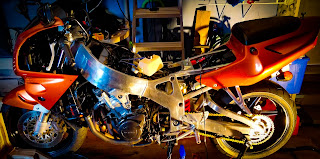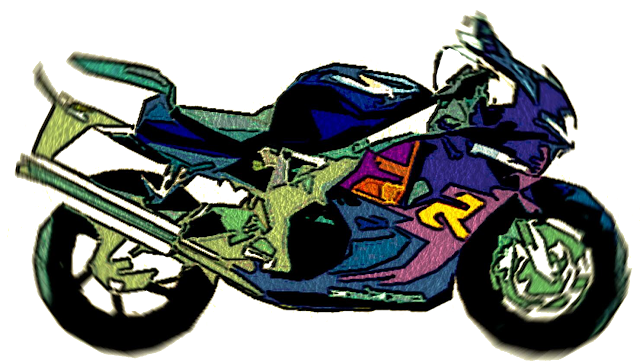 My birthday and Father’s Day are within a month of each other, so I made a combined ask and got a day at S.M.A.R.T. Adventures in Horseshoe Valley. My previous off road experience was limited to a couple of hours on a dirt bike at a farm many years ago and a short and frustrating go with a KLX250. My goal in taking the S.M.A.R.T. (Snowmobile, Motorcycle, ATV, Rider Training) course was to explore those aspects of motorcycle dynamics that are beyond the range of typical road riding – unless you’re in the middle of a crash.
My birthday and Father’s Day are within a month of each other, so I made a combined ask and got a day at S.M.A.R.T. Adventures in Horseshoe Valley. My previous off road experience was limited to a couple of hours on a dirt bike at a farm many years ago and a short and frustrating go with a KLX250. My goal in taking the S.M.A.R.T. (Snowmobile, Motorcycle, ATV, Rider Training) course was to explore those aspects of motorcycle dynamics that are beyond the range of typical road riding – unless you’re in the middle of a crash.
There are a lot of people who try motorcycling then retire early. They often have a lot of advice. Many of these short-term motorcyclists liked to warn me earnestly and repeatedly about how dangerous it was to ride to early or late in the season when there was a chance of sand being on the road. Anything that wasn’t table top smooth, grit free tarmacadam meant zero traction and an imminent crash for these earnest scare mongers.
 |
| You owe it to yourself to experience motorcycling in unfamiliar ways… |
I’ve always ridden on loose material with caution, but after watching a riding buddy with many years of experience step his heavy Super Ténéré out sideways on gravel roads, I’ve thought that there is more to gravel and sand than just being cautious. Between that and my Dakar fixation, it was time to learn something new. That same guy was the one who suggested the SMART program (he’d been on it previously). Here was an opportunity to treat loose material as something other than an imminent crash.
That anxiety about traction on a motorbike runs deep in the limited experience motorcycle crowd, and that crowd contains a lot of people who have only ever done a single type of riding on a single type of bike. If you’re going to call yourself a motorcyclist you owe it to your craft to experience as many different types of riding as you can. The SMART program is an accessible opportunity to do that in the trail riding/off road community in a controlled environment on someone else’s equipment (they even provide all the gear).
We started an already nuclear hot day before Canada Day with the affable Clinton Smout going over basic control and balance with a GasGas trials bike. In no time he had everyone from old guys like me to nine year olds balancing on two wheels while stationary. I wouldn’t have thought that was possible prior – but I was able to stand on the pegs on the stationary bike until my legs got tired.
Clinton also gave the dry stick demonstration, showing how an old, brittle stick snaps easily compared to a young, supple one. He then went on to say that SMART is about to have its hundred-thousandth customer in the next few weeks and in the decades it has been running they’ve only had twenty-two ambulances, all of them for old, dry sticks over thirty-five years old. This forty-nine year old stick paid close attention to this talk.
Within minutes we’d been set up with Joe, the advanced instructor who has over thirty years of experience off road. I was worried about being put in the advanced group with so little off road experience but they’re more worried about whether or not you know how to ride a bike; if you know the controls, you’re advanced. There were larger groups of beginners and intermediate riders learning the basics, but we were just three: Joe, me and a German fellow with motocross experience who has ridden every pass in the Alps. I was still feeling a bit out of my depth and didn’t want to slow anyone down.

We spent some time by the main centre going up and down the hills under the watchful eye of Joe. I suspect this had more to do with assessing our riding skills than it did anything else. We did some hill climbs, but on a dirt-specific bike with knobbly tires this was an easy thing to do. We were on Yamaha TT-R230cc bikes, which might seem a bit on the small side, but the characteristics of this bike were very forgiving; it would pull hard out of any gear. Joe described them as tractors, and they were. If it stalled, the electric start fired it right up again, and the massive suspension travel and tires made easy work of every obstacle.
Soon enough we were off into the woods. We’d stop under the trees out of the blinding sun and 40+°C humidity and practice skills such as clutch control on walking speed turns, rear wheel lockups and eventually crossing large logs. As my confidence improved so did my speed on the trails, which we’d go and ride to make some wind and cool down between slow speed work. I was able to keep up with Joe on all but a steep, washed out hill covered in big rocks where I ended up pulling off to the side for a moment to collect myself. That had more to do with sewing machine legs than it did with bad technique. If you think off road motorcycling isn’t physically demanding, you’ve never done it before. In forty plus degree temperatures, we were necking a bottle of water every time we went back to base.
 On our next run we focused on standing on the pegs and working the bike with body position and weighting the side we wanted to move to. This involved going over improbably deep ruts while soaking up the vertical movements with the suspension and our legs while also making micro-adjustments to clutch, throttle and brakes to keep things moving smoothly. If you think riding a motorcycle is dexterous, trying to operate controls with all four appendages while dropping into foot deep ruts ups the ante again.
On our next run we focused on standing on the pegs and working the bike with body position and weighting the side we wanted to move to. This involved going over improbably deep ruts while soaking up the vertical movements with the suspension and our legs while also making micro-adjustments to clutch, throttle and brakes to keep things moving smoothly. If you think riding a motorcycle is dexterous, trying to operate controls with all four appendages while dropping into foot deep ruts ups the ante again.
At one point we were purring through the forest (the little Yamahas are remarkably quiet for one cylinder thumpers) when Joe held a hand up and made the kill the engine sign. We all rolled to a stop and not fifteen feet away was a fully grown doe (a deer, a female deer). She stood there munching her grass while watching us from a sunny glade, looking like a scene out of Bambi. After a minute or so she ambled off into the brush. My son took the ATV course in the afternoon and they came across wild turkeys – you’re likely to see some wildlife when out in the woods.
As lunch approached our experienced German went and rode with his son and Joe and I went deeper into the woods, now on trails that would barely qualify as a walking path. The SMART program is based in Beaver Valley, which is part of the Niagara Escarpment. The Beaver River has cut the valley through the escarpment, which is also scattered with post glacial erratics (big rocks). You’re working big elevation changes through thick forest including stumps and downed logs along with some very rocky sections; it’s a challenging mix. Now that I was getting the hang of it, I was spending half my attention watching Joe’s thirty plus years of trail riding experience as he picked out lines through this spaghetti. We’d stop every once in a while and have a quick chat about what was going on, with Joe giving gems like, “you’ll see me going for the hard pack on the side of the trail, especially when you see all that loose stuff in the middle. The loose stuff falls into the gulley in the middle and can get pretty deep.”

We had a quick lunch, but it was so hot I forced myself to eat something even though I had no appetite. More importantly was getting water into me. By now we were well into the forties Celsius with the humidity, and everyone was drooping. My son had arrived for the ATV training and soon enough he was off and doing loops in the compound, getting a handle on the thing.

As the dust got kicked up in the in-field we disappeared into the woods onto even tighter trails. I stalled going up a hill so steep that I had to roll it backwards down it to get the carb to feed again and restart it. Joe then showed me how to roll it backwards on the clutch while powered off and in gear in a controlled manner to get out of a tight spot on a hill. By this point I was keeping up with Joe as he was making tracks. It was then that he asked if I’d be interested in going out on a BMW F800GS for the last part of the day. We’d wrung the necks of the Yamaha dirt bikes doing over fifty kilometres, so I said, ‘absolutely!’. It’d be a chance to try a different bike, which I never say no to.
 I’d ridden a BMW once before while riding the south end of Vancouver Island a few years ago. It was an F800ST – the sports touring version of the adventure bike I was going to ride now. The F800GS is a nice, tall bike which fits me well. The controls feel quality, as do the suspension and tires, which cornered so well I forgot they were knobblies.
I’d ridden a BMW once before while riding the south end of Vancouver Island a few years ago. It was an F800ST – the sports touring version of the adventure bike I was going to ride now. The F800GS is a nice, tall bike which fits me well. The controls feel quality, as do the suspension and tires, which cornered so well I forgot they were knobblies.
Joe took us out onto the road and we disappeared into the Copeland Forest for a couple of hours, skipping our water break and riding everything from pavement to fire roads, to dual tracks and, finally, single track trails. The BMW was obviously much bigger than the Yamaha we’d been on earlier (114kgs for the Yamaha, 229kgs for the BMW), but it’s amazing how off-road capable it is considering that weight difference. It feels balanced and nimble. The only thing stopping you from trying the really gnarly trails would be if you got stuck (and what it would cost to fix it). Getting this out of a hedge wouldn’t be anything like as easy or cheap as the simple, little dirt bike.
 Riding the BMW reminded me of the limitations I experienced with the KLX250 I purchased a couple of years ago. It was off road capable (I forded rivers with it), but as a dual purpose bike it couldn’t carry me at what I considered a safe speed on the road (it would barely touch 100km/hr, which is what most traffic is doing on Canadian back roads). The BMW was quick and capable on the road, and when we went off road (though on nothing as gnarly as we did on the Yamaha), it did the job without any surprises. Like the F800ST I rode a few years ago, the twin engine felt agricultural and uninspiring, though it was certainly quiet and efficient. Compared to the exhaust popping and snarling, induction howling Tiger, the engine felt rather characterless which is a shame considering what a lovely thing the rest of the bike is. The suspension was so good it made me wonder if the wooden shocks on my Tiger are in need of some attention.
Riding the BMW reminded me of the limitations I experienced with the KLX250 I purchased a couple of years ago. It was off road capable (I forded rivers with it), but as a dual purpose bike it couldn’t carry me at what I considered a safe speed on the road (it would barely touch 100km/hr, which is what most traffic is doing on Canadian back roads). The BMW was quick and capable on the road, and when we went off road (though on nothing as gnarly as we did on the Yamaha), it did the job without any surprises. Like the F800ST I rode a few years ago, the twin engine felt agricultural and uninspiring, though it was certainly quiet and efficient. Compared to the exhaust popping and snarling, induction howling Tiger, the engine felt rather characterless which is a shame considering what a lovely thing the rest of the bike is. The suspension was so good it made me wonder if the wooden shocks on my Tiger are in need of some attention.
We rolled back in at the end of the day just a few minutes before the other classes returned, and drank a lot of water. I’d covered well over 100 off and on road kilometres over the day on two very different bikes. Joe was approachable and willing to answer any questions, but better than that he used decades of experience to quickly assess where I was at and then lay down a series of increasingly challenging lessons that kept me on the edge of my learning curve all day.
I’d been sweating for hours and was ready to get out of the armour and go and wash the caked on dirt away. My wonderfully wise wife who did all the photography you see here had also arranged a room at the Horseshoe Resort next door, so within twenty minutes I was flat out in a pool thinking about the day. I’d managed not to dry-stick my way into anything I couldn’t handle and was in good, but muscle sore shape.
 My son has always been a cautious fellow and reluctant to ride or drive, but he spent a very intensive two hours with Adam on the ATVs and rolled back in looking like he was ten feet tall. It’s amazing what an accessible, patient instructor can do for your confidence. By the end of the day he was talking about driving the ATVs up at the cottage, which had never been a consideration before.
My son has always been a cautious fellow and reluctant to ride or drive, but he spent a very intensive two hours with Adam on the ATVs and rolled back in looking like he was ten feet tall. It’s amazing what an accessible, patient instructor can do for your confidence. By the end of the day he was talking about driving the ATVs up at the cottage, which had never been a consideration before.
I can’t recommend S.M.A.R.T. highly enough. If you’re an experienced road rider you own it to your craft to spend some time learning these skills, they might save your bacon one day. If you’ve never tried offroad powersports before and are looking for an accessible and relatively inexpensive (it’s about $200 for a half day and $300 for a full day – all in including all gear and equipment) way to get into it, this’ll do that too. We’ll be back again.
 With amusement park tickets north of a hundred bucks, you’re close to the cost of a day at SMART to park, eat, stand in lines and sit on roller coasters at Wonderland. Why on earth would you line up to passively experience fake thrills when you could get learn real world skills and experience real world thrills at SMART? No line ups, no crowds, (though deer and turkey on occasion) and a great day becoming genuinely accomplished in the great Canadian outdoors. How could you say no to that?
With amusement park tickets north of a hundred bucks, you’re close to the cost of a day at SMART to park, eat, stand in lines and sit on roller coasters at Wonderland. Why on earth would you line up to passively experience fake thrills when you could get learn real world skills and experience real world thrills at SMART? No line ups, no crowds, (though deer and turkey on occasion) and a great day becoming genuinely accomplished in the great Canadian outdoors. How could you say no to that?




 |
| The 230cc Yamaha I rode typically lasts 6-8 years. They do a lot of on-site maintenance. One of the instructors said that they don’t wear out engine wise as they aren’t ridden that hard, but the transmissions suffer from a hard life with many people new to bikes learning how to clutch and gear on them. |
LINKS:
from Blogger https://ift.tt/2ILnCmc
via IFTTT



























































